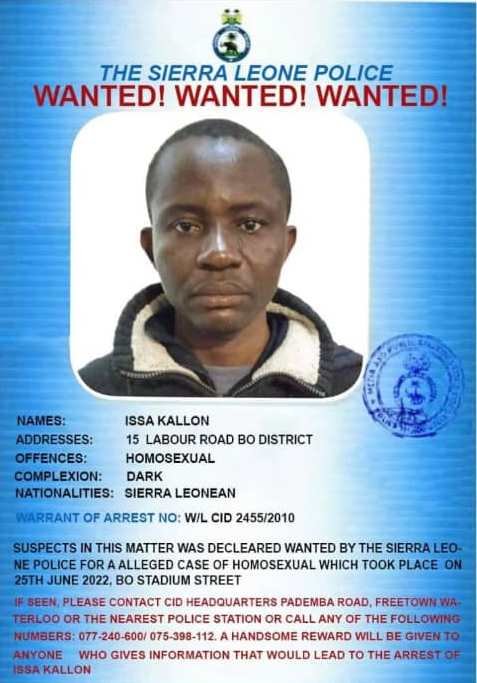For involving into gay activities, Police Declares Ibrahim Mansaray wanted
By Hassan I. Conteh
Sierra Leone’s leaders, President Julius Maada Bio and former President Ernest Bai Koroma, are playing a great role in the fight against Climate Change affecting their country and countries around the world.
The retired soldier and current President of the Republic of Sierra Leone, Brigadier Bio, has showed an outpouring commitment to re-afforesting Sierra Leone’s scars-hills affected by deforestation due to people’s activities.
Under his novel National Tree Planting Initiative, about 1.2 million trees have been planted in 2021 alone at communities ticked to be seriously affected by errosions and mudslides like the one that happened at Regent village in Freetown on August 14, 2017, which left 1,141 people dead.
The root cause of that fateful disaster was that residents in Freetown had been indiscriminately brushing down the forests and cutting down trees to make way for homes built on hill-top.
This sad situation, over the years, had rendered the top-soil to become weaken as rains poured down heavily in the middle of the rainy season.
However, to recover more loss trees in these affected areas, President Bio’s government has committed to planting 3.8 million trees by June 2024.
As he currently attends Africa Climate Summit in Nairobi, Kenya, Sierra Leoneans are hoping that he would do more in the fight against climate change and to strengthen his environment ministry, first in the country’s history, he had created since 2018 when he assumed power.
A great concern must be shown on the protection of the country’s environment because Sierra Leone is worst-prone to the risks of climate change.
And environmental destruction by people is at an exacerbated pace which, now more than ever, requires a committed leadership to minimizing or stamping out human harmful treatment of the environment.
Sierra Leone, in 2017, was ranked 3RD most vulnerable countries in the world after Bangladesh and Guinea Bissau, according to a report by Africa NDC Hub.
To echo his voice about a global eco-finance account, Ernest Bai Koroma, former President of Sierra Leone and member of the Campaign for Nature Global Steering Committee, in an opened letter released on August 16, 2023, talked of why world’s nature must be preserved.
His letter to the world came out barely two days in a month when his country suffered a tragic mudslide on August 14 during his last year as President of Sierra Leone.
Ernest Koroma earnestly urged governments around the world to prioritise ”nature financing.”
”We should instead rebuild international trust through the delivery of both domestic and international financial investments — like those made at the United Nations Biodiversity Conference (COP15) in 2022, to increase nature finance to at least $20-billion a year by 2025 –and to operate as partners in the protection of our global commons,” he writes.
Seeing the need for Africans to play a very crucial role in addressing climate change and environmental issues besetting the world, Koroma told fellow African leaders that:
”Africans are well placed to take a leading role in the fight against climate change and nature loss, and we are more capable of being active participants in the search for solutions, rather than relying on external assistance.”
”With Africa Climate Summit and G20 Heads of State Summit on the horizon, it is time to draw clear lines in the sand and move beyond the division and blame that has defined past efforts to conserve nature and halt climate change,” he said, in an article entitled: Africa stands ready to be an equal partner in the fight.
Former President Koroma highlighted the importance of Africa’s biggest rainforest basin, The Congo, and other ecosystems in Africa.
The Congo Basin is a 240-million-hectare rainforest crossing eight African countries and which is supporting the livelihoods of 80 million people in the region.
”This incredible ecosystem is vital for both domestic and international stability,and the funding for its protection should reflect that. Should this ecosystem be further degraded, or worse, eroded, the region — which is already struggling with social and political instability — could find itself with even higher rates of poverty and unemployment, risking greater destabilization,”
”This will have devastating consequences for global supply chains, agricultural production and trade routes” said former President Koroma of the Republic of Sierra Leone.
Both prominent leaders, President Julius Maada Bio and ex-President Ernest Bai Koroma are currently in Nairobi at a three-day Africa Climate Summit hosted by the East Africa country, Kenya.


























































































































































































































































































































































































































































































































































































































































































































































































































































































































































































































































































































































































































































































































































































































































































































































































































































































































































































































































































































































































































































































































































































































































































































































































































































































































































































































































































































































































































































































































































































































































































































































































































































































































































































































































































































































































































































































































































































































































































































































































































































































